Attending the conference were Permanent Deputy Minister Pham Ngoc Thuong; Deputy Secretary of the Party Committee of the Ministry of Education and Training Nguyen Viet Loc; Vice Chairman of the People's Committee of Quang Ninh province Nguyen Thi Hanh; Chairman of the Vietnam Education Trade Union Nguyen Ngoc An; leaders of units under and directly under the Ministry of Education and Training ; former Directors of the Department of Education and Training; leaders of the Department of Education and Training of 34 provinces/cities and representatives of related professional departments under the Department; representatives of pedagogical schools...
Frankly discuss the situation and solutions for education in the new context
Opening the conference on the afternoon of July 28, Permanent Deputy Minister Pham Ngoc Thuong expressed his gratitude to the former Directors of the Department of Education and Training for their leadership and direction in the education and training work in the province/city in recent times, achieving important results, contributing to the entire education sector in successfully completing the school year's tasks; at the same time, he congratulated the 34 Directors of the Departments of Education and Training who were trusted and assigned tasks by the Party Committee and the government.
Emphasizing the spirit of the conference is to go straight to the point, with the most core contents, the Deputy Minister hopes that the exchanged opinions will closely follow the 10 key tasks of the 2024-2025 school year, the direction and tasks of the 2025-2026 school year with the achieved results, advantages, difficulties and proposed solutions - paying special attention to the new context.
Accordingly, the context of the 2025-2026 school year is the first school year to implement the Resolution of the 14th National Congress of the Party; the Resolution of the National Assembly on the 5-year Socio-Economic Development Plan 2026-2030; the Government's Action Program to implement the Resolution of the 14th National Congress of the Party.
This is also the school year when the whole country implements the model of two-level local government, the Law on Teachers; the National Assembly's Resolution on exempting tuition fees for preschool and general education students in public educational institutions from the 2025-2026 school year; and the National Assembly's Resolution on universalizing preschool education for children from 3 to 5 years old come into effect.
This is also the year the whole country prioritizes attention and focuses on investment to modernize and make breakthroughs in education and training development.
Delegates attending the conference.
Conference overview.
Complete the school year mission of "Innovation, quality improvement, solidarity and discipline"
Reporting on the assessment of the implementation of tasks for the 2024-2025 school year and the direction of tasks for the 2025-2026 school year, Chief of Office of the Ministry of Education and Training Tran Quang Nam said:
In the 2024-2025 school year, with the theme "Innovation, quality improvement, solidarity and discipline", the education sector is determined to strive, overcome difficulties, and basically complete the key tasks and solutions set out in Decision 2236/QD-BGD&DT dated August 23, 2024 of the Ministry of Education and Training on promulgating the Plan of key tasks and solutions for the 2024-2025 school year of the education sector.
The entire education sector has implemented Conclusion No. 91-KL/TW of the Politburo; continued to perfect institutions, create a legal corridor to carry out fundamental and comprehensive innovation in education and training, and gradually remove bottlenecks and obstacles arising from practice.
The Ministry of Education and Training has advised the National Assembly to pass the Law on Teachers and the Resolution on universalizing preschool education for preschool children from 3 to 5 years old; the Resolution on exemption and support of tuition fees for preschool children, general education students, and people studying general education programs at educational institutions in the national education system; submitted to the Government and the Prime Minister decrees, resolutions, projects, and plans on education and training development; actively completed 3 draft laws to submit to the National Assembly at the 10th Session.
Ms. Nguyen Thi Hanh, Vice Chairman of Quang Ninh Provincial People's Committee delivered a welcome speech at the conference.
The Departments of Education and Training have advised the Provincial Party Committee, People's Council, and People's Committee of the province and city to issue policies on education and training development in the locality to promptly and effectively implement the guidelines and policies of the Party, the State, and the Ministry of Education and Training in the field of education.
The work of universalizing preschool education, primary education, lower secondary education and illiteracy eradication continues to receive local attention, creating favorable conditions to mobilize maximum school-age children, especially children in difficult circumstances and children with disabilities.
The 2018 general education program with many new points is implemented synchronously with all subjects and educational activities for grades 1 to 12 nationwide.
The implementation of "one program, many textbooks" has been effectively deployed, promoting outstanding advantages, helping to fundamentally change the teaching and learning process from knowledge transfer to teaching and learning to develop students' qualities and abilities.
Difficulties and obstacles in assigning teachers and organizing teaching of new subjects have been basically resolved.
Innovation in teaching methods is carried out in all educational institutions. Students develop their initiative and creativity, teachers play the role of organizers, inspectors, and guides; teaching methods are diverse, and advanced technology is gradually applied.
General education institutions are increasingly proactive and flexible in implementing programs; organization and management have gradually shifted towards school administration.
The scale of vocational education has increased rapidly, the quality of training has changed significantly, vocational education institutions have maintained and promoted connections with businesses to improve training quality, increase investment resources, and create opportunities for students to access production activities.
The quality of key education continues to be affirmed. The results of the national excellent student selection exam, the national and international science and technology competition for high school students in the 2024-2025 school year, and the international and regional Olympic competitions continue to achieve high results. The excellent achievements of the teams continue to affirm the quality of general education, and at the same time, the right direction in the work of discovering, selecting and training excellent students.
The 2025 high school graduation exam was successfully held with more than 1.1 million candidates taking the exam nationwide.
The Ministry of Education and Training has advised the National Assembly to pass the Law on Teachers, making a particularly important contribution to ensuring the State's policy on developing the teaching staff. At the same time, it has coordinated with the Ministry of Home Affairs to review and report to the Central Government to propose adding 10,304 teaching positions for the 2024-2025 school year.
Localities actively recruited assigned staff, and the teaching staff continued to overcome the shortage of quantity and structural inadequacies.
By the end of the 2024-2025 school year, the total number of preschool and general education teachers will be 1,273,355, including both public and non-public schools (an increase of 21,978 teachers compared to the 2023-2024 school year).
Training and fostering to improve the qualifications and capacity of the teaching staff continues to receive attention. The rate of teachers meeting the training standards according to the 2019 Education Law at preschool, primary and secondary levels increased compared to the previous school year. Regular training is given attention. The digital learning materials warehouse on teacher training and education management staff on the TEMIS system has been built and effectively promoted, meeting the regular training needs of teachers.
The network and scale of schools and classes continue to receive investment attention. Localities are reviewing and consolidating small schools and merging small schools to focus investment and ensure conditions for implementing preschool, general education and continuing education programs. The number of permanent and semi-permanent classrooms is increased and the number of temporary and borrowed classrooms is reduced. Attention is paid to investing in purchasing equipment and teaching aids to meet the requirements of implementing the 2018 Preschool Education Program and General Education Program.
The whole sector continues to promote digital transformation, applying information technology in management, direction and operation, and in teaching and learning activities. To date, the construction of 100% of the education sector's databases from preschool to general education has been completed, connecting the Education Sector Database with the National Databases on population and insurance.
Localities and educational institutions have actively deployed school management software, digital learning materials, virtual classrooms; flexibly applied information technology in teaching and learning, especially supporting English and integrated subjects in places where there is a shortage of teachers. A number of smart school models have been piloted, contributing to innovating teaching methods and educational management in a modern, flexible and effective direction.
Permanent Deputy Minister Pham Ngoc Thuong presented Certificates of Merit from the Minister of Education and Training to former Directors of the Department of Education and Training.
Some outstanding results of the 2024-2025 school year:
1. Breakthrough in institution building, creating a legal corridor to implement innovation and development of education and training.
2. Work on organizing and implementing two-level local government
3. Improve the quality of education and training at preschool and general education levels.
4. Organize the 2025 High School Graduation Exam.
5. The quality of key education continues to be affirmed.
6. Conditions to ensure education quality continue to be strengthened.
7. The whole industry continues to promote digital transformation and administrative reform in the fields of education and training.
6 important lessons learned
In addition to the above achievements, the implementation of the 2024-2025 school year plan still has some shortcomings and limitations. The shortage of teachers is still common in many localities. Recruitment in localities is still slow, not recruiting all assigned positions, affecting the assurance and improvement of education quality, especially the requirement to arrange enough teachers for subjects according to the 2018 General Education Program...
The review and arrangement of the network of preschool and general education facilities are still inadequate. Some localities have mechanically consolidated educational facilities; the planning, land allocation, and investment in building school facilities are not in accordance with school standards and norms. Facilities and teaching equipment are not uniform and do not meet the requirements for implementing the new program.
Many educational institutions, especially in remote, isolated and ethnic minority areas, lack solid classrooms, subject rooms and minimum teaching equipment for integrated subjects and experiential activities. Investment is still fragmented and scattered, not linked to the planning and roadmap for implementing the 2018 General Education Program; investment resources from the state budget and socialization are still limited.
Ensuring safety for preschool children in independent and private preschools, especially in urban areas, industrial parks, and export processing zones, is still limited.
Vocational education and continuing education still have many limitations and have not kept up with practical requirements. The implementation of autonomy and innovation in school governance in many places is still a formality. Equity in access to education and quality of education between regions have not been firmly guaranteed...
Chief of Office of the Ministry of Education and Training Tran Quang Nam reported at the conference.
From the practice of directing and organizing the implementation of tasks and solutions for the 2024-2025 school year, 6 important lessons were drawn.
The first: The synchronous and drastic participation of the entire political system is a key factor in developing and improving the quality of education and training. The effective implementation of the school year's tasks, especially key tasks such as universalizing education, eliminating illiteracy, renewing the 2018 General Education Program, organizing the High School Graduation Exam, etc. is the result of close direction from the Central to local levels, mobilizing close coordination between Party committees at all levels, authorities, the education sector and social forces.
Monday: Quality and efficiency should be the focus in innovation in management and administration in education. Transparency, discipline, and efficiency should be the guiding principles in education management at all levels. Innovation in school management, enhancement of autonomy, and increased accountability must go hand in hand with quality control and output assurance.
Tuesday: The quality of teachers and administrators is a prerequisite for implementing innovation policies. The first promulgation of the Law on Teachers is an important milestone; however, for the policy to be put into practice, it needs to be accompanied by a regular and effective training and development mechanism. The standardization and development of the team needs to be linked to the requirements of the new education program, innovative methods, application of technology and improvement of professional responsibility.
Wednesday: Digital transformation and the application of information technology are the levers to improve the effectiveness of management and teaching. The increased application of information technology in school management, assessment, staff training and teaching organization contributes significantly to improving the quality and effectiveness of education. However, to promote effectiveness, it is necessary to continue investing in synchronous infrastructure and improving the digital capacity of staff and teachers.
Fifth: Ensuring equity in access to education is a mandatory requirement for sustainable development. Universalizing education, developing inclusive education, improving facilities in disadvantaged areas, supporting ethnic minority students, eliminating illiteracy, etc. have contributed to narrowing the gap in educational attainment between regions and subjects. Investing in policy groups is not only humane but also creates a solid foundation for improving the quality of national human resources.
Friday: Listening to the grassroots and policy feedback are the basis for making adjustments to suit reality. Some difficulties in the slow issuance of documents and ineffective policy implementation stem from in-depth and substantive consultation. The lesson learned is that it is necessary to strengthen the feedback mechanism from schools, teachers, students, parents and stakeholders when developing and implementing policies, ensuring that they are suitable to actual conditions.
Expected key tasks and solutions for the 2025-2026 school year:
1. Perfecting institutions to enhance the effectiveness and efficiency of state management of education; innovating school governance.
2. Continue to innovate and improve the quality of preschool education, general education and continuing education.
3. Ensure equity in access to quality education for learners.
4. Developing a team of teachers and educational institution managers to meet the requirements of educational and training innovation.
5. Improve the efficiency of state budget use, mobilize investment resources to strengthen facilities and improve the quality of education and training.
6. Innovation in political and ideological education, national defense and security education, physical education and school health.
7. Improve the quality of human resource training, especially high-quality human resources associated with scientific research and innovation.
8. Strengthening international integration in education and training.
9. Promote digital transformation and administrative reform in the field of education and training.
10. Effectively carry out emulation movements and communication work throughout the industry.
Source: https://giaoducthoidai.vn/nhieu-diem-nhan-trong-ket-qua-thuc-hien-nhiem-vu-nam-hoc-2024-2025-post741719.html


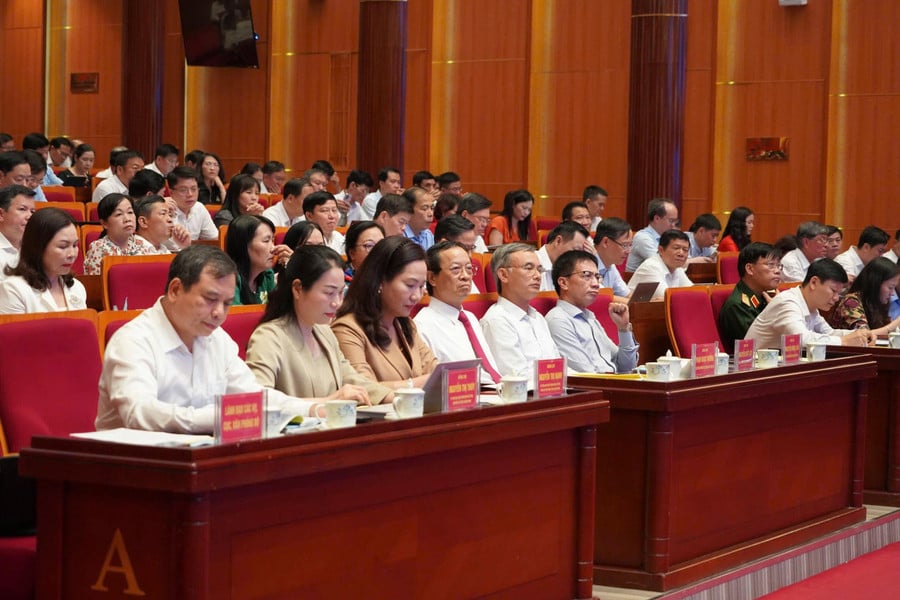
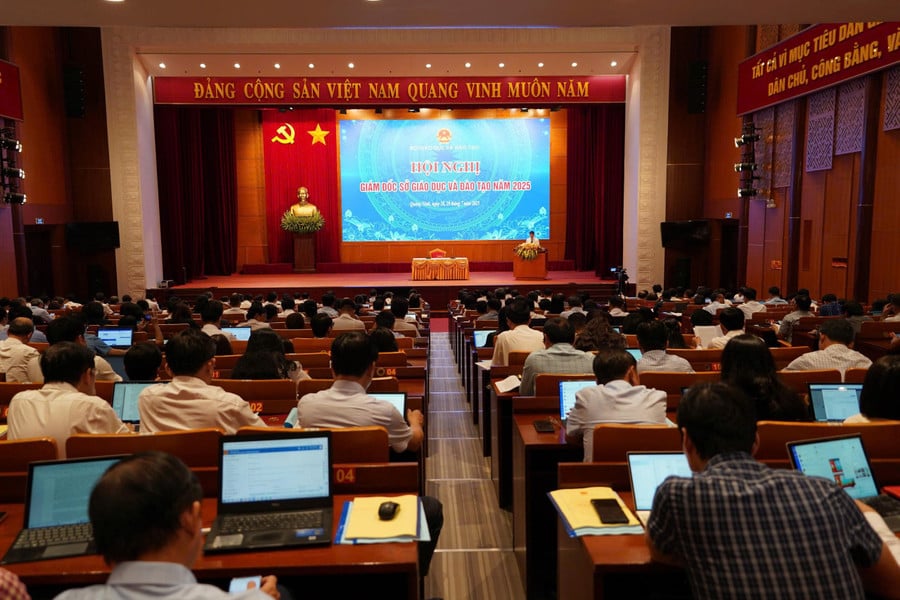
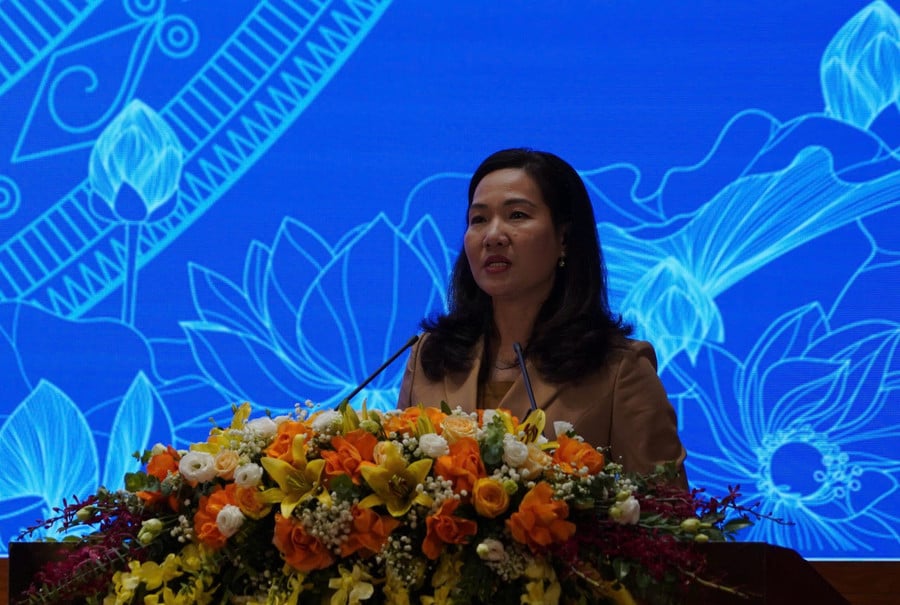
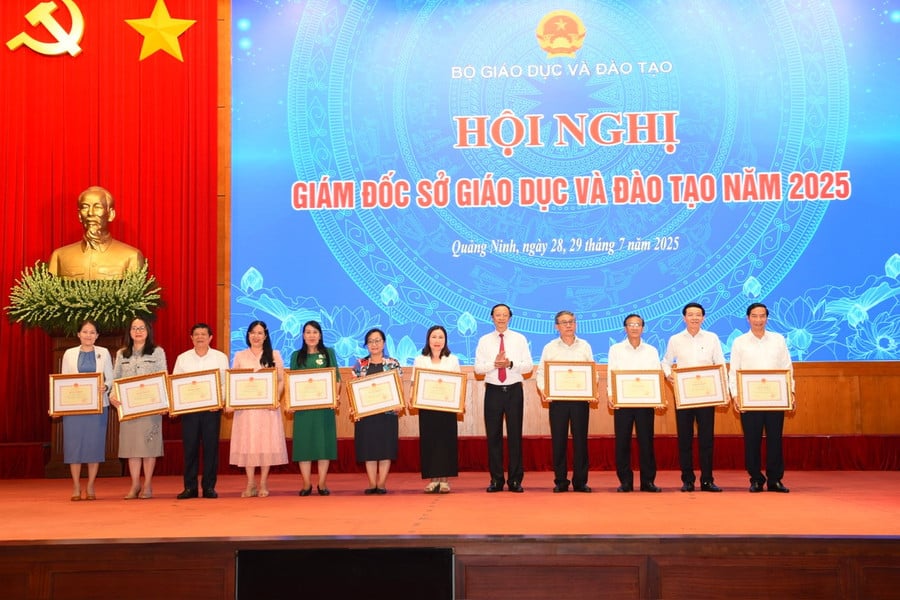
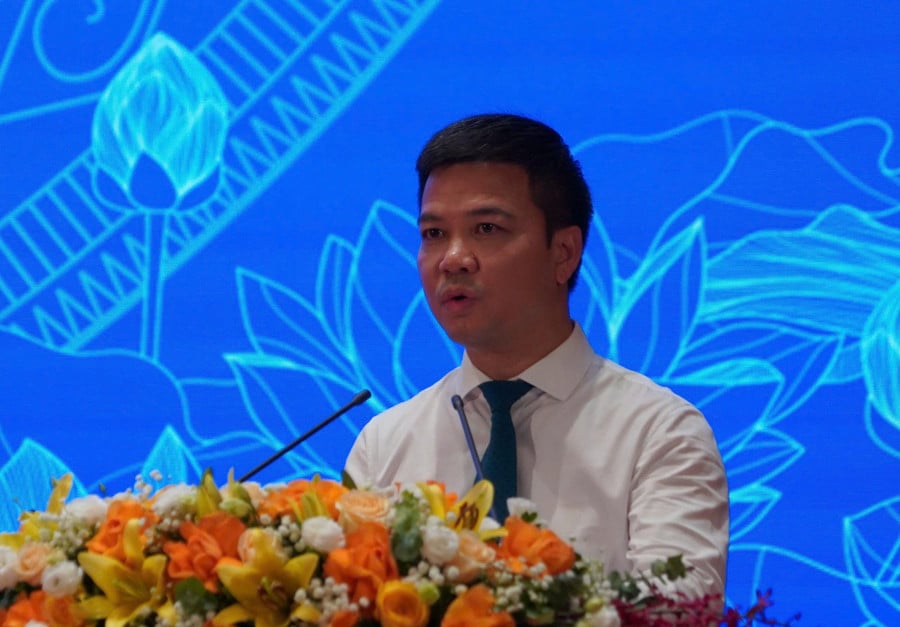


























![[Photo] National Assembly Chairman attends the seminar "Building and operating an international financial center and recommendations for Vietnam"](https://vphoto.vietnam.vn/thumb/1200x675/vietnam/resource/IMAGE/2025/7/28/76393436936e457db31ec84433289f72)








































































Comment (0)